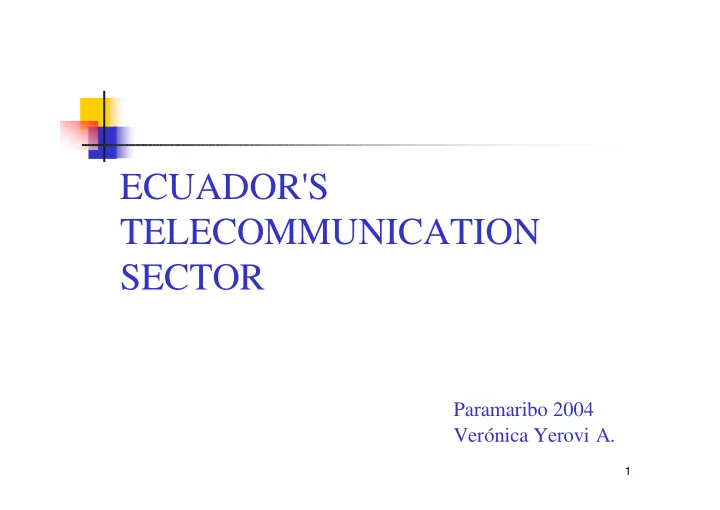

ECUADOR'S TELECOMMUNICATION SECTOR Paramaribo 2004 Verónica Yerovi A. 1
LEGISLATION PERTAINING TO THE TELECOMMUNICATION SECTOR Special Telecommunication Act � Act to reform the Special Telecommunication Act � Act for the Economic Transformation of Ecuador � Radio and Television Broadcasting Act � Act to reform the Radio and Television � Broadcasting Act LEGAL FRAMEWORK 2
TELECOMMUNICATION SECTOR ENTITIES REGULATORY FUNCTION National Telecommunication Council National Radio and Television (CONATEL) Broadcasting Council (CONARTEL) National Telecommunication Secretariat (SNT) EXECUTING AGENCY FOR Office of the Superintendent of CONARTEL EXECUTING AGENCY POLICIES Telecommunications (SUPTEL) FOR CONATEL POLICIES 3 OVERSIGHT FUNCTION
TELECOMMUNICATION SERVICES Telecommunication services fall into four groups: End-user services � Bearer services � Value-added services � Resale services � 4
LICENCES � CONCESSIONS: � End-user services � Bearer services � Use of frequencies � PERMITS: � Value-added services � Private networks � REGISTRATION: � Cybercafés � Physical networks (bearers) � Spread spectrum 5
OPERATORS SERVICE REGIME OPERATORS Fixed telephone service Competition 7 (3) Mobile telephone service Competition 3 Bearer services Competition 14 Trunk systems Competition 7 Value-added services Competition 120 (60) Cybercafés Competition 1 500 6
FIXED TELEPHONE SERVICE 7
TARIFF REGULATION Provision of a service subject to payment of � tariffs regulated under the corresponding contracts Special affordable tariffs for low-income � segments of the population Criteria for setting tariffs � Approval procedures (for public services) � 8
TARIFF REGULATION � The following services are subject to tariff ceilings: � Fixed telephone service � Mobile telephone service � The following services are not subject to tariff ceilings: � Bearer services � Trunk systems � Value-added services 9
Approved Current tariffs Difference ceilings Registration fee Category A 30.00 44.00 31.82% Category B 60.00 88.00 31.82% Category C 60.00 200.00 70.00% Basic fee Category A 1.20 + 100 minutes 6.90 + 0 minutes 82.61% Category B 7.00 + 100 minutes 8.60 + 0 minutes 18.60% Category C 12.00 12.00 0.00% Usage fees Category A Local 0.003 0.017 82.35% Regional 0.010 0.027 62.96% National 0.012 0.056 78.57% To cellular telephones 0.29 0.290 0.00% Category B Local 0.015 0.017 11.76% Regional 0.027 0.027 0.00% National 0.056 0.056 0.00% To cellular telephones 0.29 0.29 0.00% Category C Local 0.024 0.028 14.29% Regional 0.056 0.056 0.00% National 0.112 0.112 0.00% To cellular telephones 0.29 0.29 0.00% Group 2 (Mexico, USA, Canada) 0.25 0.25 0.00% 10
TOTAL TELEPHONE TRAFFIC INTERNATIONAL TELEPHONE TRAFFIC HANDLED BY ANDINATEL S.A. AND PACIFICTEL S.A., MINUTES PER IN MINUTES, 1992 TO 2003 CALENDAR QUARTER 450 000 000 400 000 000 350 000 000 300 000 000 250 000 000 200 000 000 150 000 000 100 000 000 50 000 000 0 Q4 Q1 Q3 Q3 Q3 Q3 Q3 Q3 Q3 Q3 Q3 Q3 Q3 Q2 Q2 Q4 Q4 Q4 Q2 Q4 Q2 Q4 Q2 Q2 Q3 Q2 Q4 Q2 Q4 Q2 Q4 Q2 Q4 Q1 Q1 Q1 Q2 Q2 Q1 Q1 Q1 Q4 Q4 Q1 Q1 Q1 Q1 Q1 1992 1993 1994 1995 1996 1997 1998 1999 2000 2001 2002 2003 CONSOLIDATED TOTAL GROWTH TREND OFFICE OF THE SUPERINTENDENT IET- FS / JG / SEPTEMBER 2003 OF TELECOMMUNICATIONS 11
TRAFFIC ENTERING ECUADOR HANDLED BY EMERGING CARRIERS, ACCORDING TO THE FCC Dollar value ECS 30.000.000 LOST REVENUE FROM BYPASS ECS 25.000.000 ECS 20.000.000 ECS 15.000.000 LOST REVENUE ECS 10.000.000 FROM VOIP ECS 5.000.000 ECS 0 1992 1993 1994 1995 1996 1997 1998 1999 2000 2001 2002 - FS / JG / IET OFFICE OF THE SUPERINTENDENT OF SEPTEMBER 2003 TELECOMMUNICATIONS 12
MOBILE SERVICE TARIFFS PAID IN ADVANCE � USD 0.50 � PAID AFTERWARDS � USD 0.12 � SHORT MESSAGES � Package Cost Duration 160 messages or e-mails USD 2 + VAT 30 days 300 messages or e-mails USD 5 + VAT 30 days 13
Telecommunication policies Open competition � Universal service � Promoting the development of the � Internet 14
Telecommunication policies Mandatory interconnection and connection, � thereby guaranteeing connectivity Preparating draft legislation to establish service � and network standards Promoting convergence � 15
Universal service Establishing the Fund for Telecommunication � Development in Rural and Marginal Urban Areas (FODETEL) Formulating the Universal Service Plan � Including public services (fixed and mobile � telephone service) under universal service 16
FODETEL � FODETEL is a fund set up to assist rural and marginal urban areas not covered by the expansion plans of service providers approved by CONATEL or under existing licences. � To finance this fund, all telecommunication service providers holding a licence are required each year to contribute the equivalent of 1 per cent of their service revenues from the previous year. 17
FODETEL FODETEL operates by conducting public competitions aimed at selecting the best qualified person or firm to carry out projects in specific areas, on the basis of the smallest direct subsidy or other selection criteria. 18
Telecommunication policy Promoting the development of the Internet � Encouraging the use of the Internet as a tool for furthering Ecuador's cultural, social, political and economic development. 19
Connectivity Agenda � The objective of the Connectivity Agenda is "to develop infrastructure that will give people access to information and communication technologies (ICTs), in every part of Ecuador, so that they may share in the benefits of the knowledge society". To this end, special technical committees may be set up to devise national programmes in such fields as tele- education, telemedicine, e-commerce, connectivity infrastructure and e-government. � The ultimate aim is to evolve into an information and knowledge society and to guarantee the right to access these information and communication technologies and use them in a fair and democratic way. 20
Principal lines of strategic action The National Connectivity Agenda's principal lines of strategic action are centred on access infrastructure, tele-education, telehealth, e-government and e-commerce. 21
Recommend
More recommend